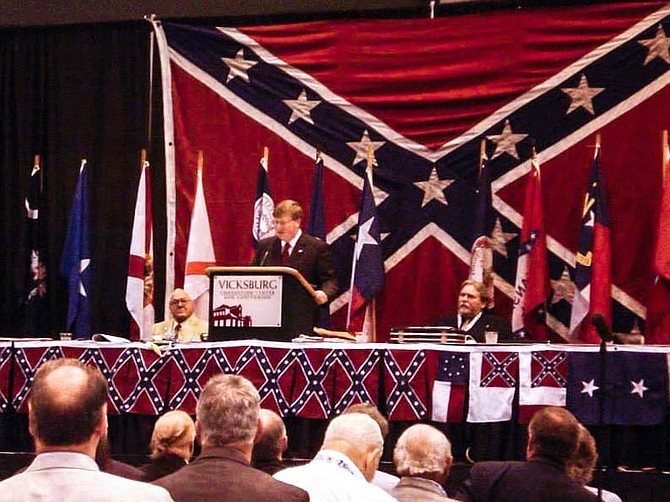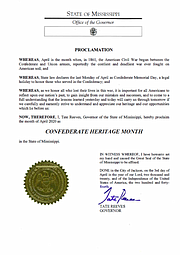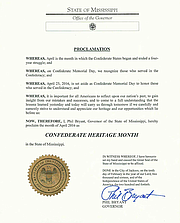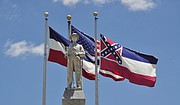Mississippi Gov. Tate Reeves spoke at the Sons of Confederate Veterans' national reunion in Vicksburg, Miss., in July 2013. Photo via R.E. Lee Camp 239 SCV Facebook group.
As coronavirus spiked across the state, the Mississippi Sons of Confederate Veterans posted a copy of an April 3 state proclamation naming this month as “Confederate Heritage Month.” Gov. Tate Reeves apparently signed the proclamation two days after he did an about-face and issued a statewide shelter-at-home order due to rising COVID-19 infections in Mississippi.
“God bless the Confederate Soldier. He shall never be forgotten. Deo Vindice!” the Mississippi SCV’s April 3 Facebook post read about the proclamation. “Deo Vindice," Latin for “Under God as our Vindicator,” appeared on the official seal of the Confederacy and was the Confederacy’s motto.
Reeves’ Language Varies from Bryant’s Proclamation
In February 2016, the Jackson Free Press discovered that then-Gov. Phil Bryant had quietly signed a similar proclamation, and broke the story that the under-the-radar proclamations had continued in Mississippi and some other states, including under previous governors. Bryant’s 2016 proclamation was not included on his official page of proclamations on his official gubernatorial website, but appeared on the website of Beauvoir, the Gulf Coast home of Confederate President Jefferson Davis, now a museum. SCV runs both Beauvoir, including a Confederate cemetery there, as well as its website.
The language varies between Bryant’s 2016 order and the 2020 version Reeves apparently signed two days ago. Bryant’s version gave responsibility for the Civil War fully to the Confederacy. Bryant’s 2016 proclamation began: “April is the month when the Confederate states began and ended a four-year struggle.” Indeed, the South started the conflict by firing on Fort Sumter, S.C., on April 12, 1861, over the right to own and extend slavery to new U.S. states.
Reeves’ opening “whereas,” however, spreads the responsibility for the war more evenly between the north and the south. “April is the month when, in 1861, the American Civil War began between the Confederate and Union armies, reportedly the costliest and deadliest war ever fought on American soil…,” his proclamation begins.
Both governors’ proclamations then mention that the last Monday in April is a state holiday in Mississippi called “Confederate Memorial Day.” Several southern states still commemorate the day the last major Confederate field army surrendered to the Union at Bennett Place in Durham, N.C., on Wednesday, April 26, 1865, officially ending the war.
The last “whereas” is virtually the same in the 2016 and 2020 versions, except that Reeves adds “as we honor all who lost their lives in this war” before proclaiming “it is important for all Americans to reflect upon our nation’s past, to gain insight from our mistakes and successes, and to come to a full understanding that the lessons learned yesterday and today will carry us through tomorrow if we carefully and earnestly strive to understand and appreciate our heritage and our opportunities which lie before us.”
In 2019, Bryant decided to declare "Unity Month" instead of "Confederate Heritage Month," responding to a request by Unite Mississippi, a Flowood, Miss.-based nonprofit that focuses on racial and social reconciliation among Christians in Mississippi.
Governors’ Ties to the Sons of Confederate Veterans
Former Gov. Bryant was an open member of the Sons of Confederate Veterans, whose members routinely claim that the Civil War was not fought over slavery. In 2018, SCV awarded Bryant with the John J. Pettus Heritage Award, named after the “fire-eater” governor and slave owner who led Mississippi into secession.
Current Gov. Reeves’ ties to the Sons of Confederate Veterans stretch back years. In July 2013, then-Lt. Gov. Reeves spoke at the group’s national reunion in Vicksburg. With a massive Confederate flag behind him and decorative arrangements of cotton on either side, Reeves “congratulated the SCV for keeping history alive for our youth,” an SCV blogger later recalled. Other speakers at the reunion defended the Confederate "cause," recast notoriously racist slaveholders as heroes, and one even compared "the Yankees" to "the Nazis."
Then-Jackson Free Press reporter Ashton Pittman reported on those remarks in February 2019 after uncovering the blog post and a little-noticed video of some of the speeches. As a 2019 Republican candidate for governor, Reeves was already under scrutiny at the time after Millsaps College yearbook photos surfaced from his time there showing members of his fraternity wearing blackface, as well as afro wigs and some of them with a Confederate X painted across their faces.
Reeves denied at the time that he ever participated in those activities.
His fraternity, though, had a reputation for fetishizing the Old South, both at the Millsaps chapter and at other colleges and universities across the country. Yearbooks from Reeves’ time include photos of the organization’s annual Old South Ball events. In one 1993 Millsaps College newspaper article that the Jackson Free Press discovered, an ad for Reeves' fraternity, the Kappa Alpha Order, included a 1966 photo of someone dressed in a black mammy costume delivering invitations to new recruits. During Reeves’ time at Millsaps, Kappa Alpha Order was also involved in several allegations of racist behavior.
Gov. Bryant Proclaims Confederate Heritage Month
The Jackson Free Press revealed to the world in February 2016 that Gov. Bryant had declared April "Confederate Heritage Month," but with no mention of slavery.
But in an op-ed for Millsaps’ Purple and White newspaper in the mid-1990s, then-student Kiese Laymon sarcastically suggested that while Kappa Alpha was the most obvious manifestation of racism on campus, institutional racism persisted throughout Millsaps. Laymon had earlier alleged that a Kappa Alpha Order member directed a racist epithet at him.
"At Millsaps, I know we've overcome racism, and if the word 'n--ger' is ever muttered, it could only be echoed in the walls of the Kappa Alpha House," author Laymon wrote then.
Kappa Alpha was known for chanting "1 2 3! Robert E. Lee! The South shoulda won!" They still describe Robert E. Lee, a slave owner and Confederate general who whipped and poured salt into the wounds of escaped slaves, as their "spiritual founder." In one of Reeves' yearbooks, the Kappa Alpha page seems to reference the future governor: "Are Justin and Tate at the Robert E. Lee bar?" it reads.
Reeves’ campaign defended his participation in the fraternity at the time, while confirming he attended Confederate-themed parties.
"Like every other college student, he did attend costume formals and other parties, and across America, Kappa Alpha's costume formal is traditionally called Old South in honor of the Civil War veteran who founded the fraternity in the 1800s," Laura Hipp, his communications director at the time, told the Jackson Free Press last year.
'Politicians, Especially in the Democratic Party, Have Been Racially Tone Deaf'
Both Reeves and Bryant are Republican governors, but Democratic leaders in Mississippi also have proclaimed Confederate Heritage Month historically and have been parts of groups that embraced racially offensive practices.
Reeves’ eventual Democratic opponent, then-Mississippi Attorney General Jim Hood, also came under fire when a 1980s University of Mississippi yearbook surfaced showing members of his fraternity wearing blackface. Hood, like Reeves, said he never wore blackface.
Facts about Mississippi, Secession, Slavery and the Confederacy
The JFP’s archives of historically factual stories about slavery, secession and the Civil War in Mississippi, with lots of links to primary documents.
"When I go hunting, I don't even like to wear a mask," Hood told reporters at the time, saying masks make him uncomfortable, and face paint would, too.
Several months later, Anastassia Doctor, an African American woman in Hattiesburg, confronted Hood at a campaign event at the University of Southern Mississippi. His response was not good enough because he did not seem to portray an understanding of why blackface is painful for black people, she said.
"As black voters, we've been shown benign neglect over and over again," Doctor told Hood. "And politicians, especially in the Democratic Party, have been racially tone deaf."
Hood responded by pointing out that, in the mid-2000s, he had successfully prosecuted Edgar Ray Killen, the klansman who planned and directed the "Mississippi Burning" murders of three young civil-rights workers in Neshoba County in 1964. He also said that he had made a practice of hiring people who “look like Mississippi” as a district attorney and as attorney general, and that her question was “a little unfair.”
"I don't even know when the picture was made, so to paint me with that is a little unfair, you know?" Hood said. "And especially if you look at my history and the cases that I've handled. The people I've fought for are the people who are the least among us no matter what their race was.”
Hood came out for changing the Mississippi flag, with the Confederate emblem in its canton, after Dylann Roof massacred black worshipers in Charleston, S.C., in 2015, and has criticized Reeves for speaking to the Sons of Confederate Veterans.
White Southerners Who Changed Their Mind About the Flag
Donna Ladd talked to white Mississippians who changed their minds about the Mississippi flag for The Guardian.
Reeves' position has long been that Mississippians voted to keep the flag as is in 2001, and neither politicians or "elites" should ignore that vote, which split mostly along race lines. Then-Lt. Gov. Reeves released a statement about the Mississippi flag after the Charleston tragedy: " Flags and emblems are chosen by a group of people as a symbol of all that unites and ties the group together," he wrote. "The good and bad in our shared history, and all that we have learned from it, is something that ties us together.
"The same discussion South Carolinians are having now is one that Mississippians had 14 years ago when nearly two-thirds of our state voted to keep our current flag. If the citizens of our state want to revisit that decision, and I am sure at some point we may, it will best be decided by the people of Mississippi, not by outsiders or media elites or politicians in a back room."
The Jackson Free Press, as well as The Clarion-Ledger, has asked the Mississippi State Department of Health to provide race demographics on COVID-19 cases and deaths to date, but so far the State of Mississippi has declined.
Reeves' office had not returned requests for comment by publication time.
Email Editor-in-chief Donna Ladd at donna@jacksonfreepress.com and follow her at @donnerkay on Twitter. Read more coverage of issues related to the Confederacy and slavery at jacksonfreepress.com/slavery. This piece includes archival reporting by Ashton Pittman
More like this story
- Hood Takes Heat for Blackface Photos, Says Leave Trans Rights Up to Schools
- Hood: Judge Tate Reeves for 'Rebel Flags,' Not Frat's College Blackface
- Till Marker Pic Shows 'Little Progress' in State, Lawmaker Says
- Tate Reeves Spoke at Event Where 'Yankees' Were Compared to 'Nazis'
- Lt. Gov. Tate Reeves' Fraternity Wore Black Face, Hurled the N-Word at Black Students
More stories by this author
- EDITOR'S NOTE: 19 Years of Love, Hope, Miss S, Dr. S and Never, Ever Giving Up
- EDITOR'S NOTE: Systemic Racism Created Jackson’s Violence; More Policing Cannot Stop It
- Rest in Peace, Ronni Mott: Your Journalism Saved Lives. This I Know.
- EDITOR'S NOTE: Rest Well, Gov. Winter. We Will Keep Your Fire Burning.
- EDITOR'S NOTE: Truth and Journalism on the Front Lines of COVID-19








Comments
Use the comment form below to begin a discussion about this content.